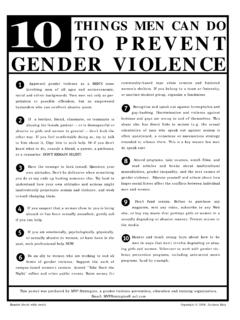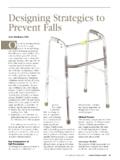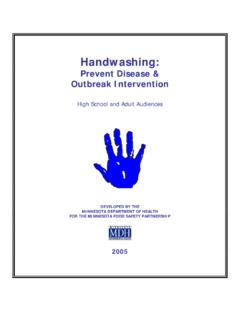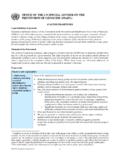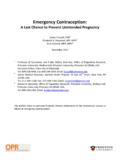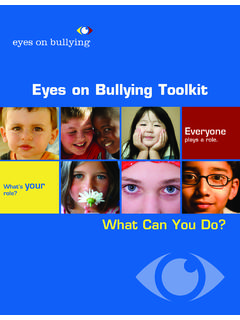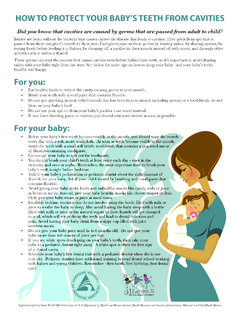Transcription of Best Practices for Parent Education Programs Seeking to ...
1 best Practices for Parent Education Programs Seeking to prevent Child Abuse Lisa C. Shannon, Extension Associate: Children, Youth, and Families North Carolina State University Cooperative Extension Service The Nature of the Problem treating child abuse victims and abusers, placing abused children in Child abuse continues to be a major appropriate care, and taking legal action problem in the United States. In 2000, against the abuser. the National Child Abuse and Neglect Data System found that of the three Risk Factors for Child million suspected child maltreatment Abuse cases reported to Child Protective Service agencies across the nation, There are many factors that increase about 879,000 children were victims of the likelihood that parents will abuse child maltreatment. Approximately 63% their children including the following: of these children were victims of neglect, 19% were abused physically, Factors associated with poverty, 10% were abused sexually, and 8% such as unemployment, low level of were psychologically abused.
2 In most of Education , and earning an annual these cases, the children's parents were income of less than $15,000. the abusers. Being a teen Parent Having many closely spaced children Children who are abused suffer from a variety of negative outcomes in addition Experiencing high levels of conflict in to any injuries they sustain as a direct one's family result of the abuse. Compared to Holding unrealistic expectations children who are not abused, these about parenting and about what children are at greater risk for children are capable of doing experiencing low self-esteem, a lack of Having a negative attitude towards self-control, higher levels of aggression one's children and violence, academic and vocational Using authoritarian parenting styles, problems, depression, alcoholism, with lots of control but little warmth interpersonal problems, and increased Using physical punishment likelihood of abusing their own children.
3 Having a history of abuse (either as Many of these problems continue into a victim or perpetrator of abuse). adulthood. Communities also Experiencing low self-esteem, experience many hardships caused by depression, anxiety, or other mental child abuse, as they have to shoulder health problems financial, social, and other burdens Having a substance abuse problem associated with child maltreatment, such A lack of social support from friends, as investigating child abuse reports, family, and other networks 1. Experiencing high levels of stress act out several scenarios that parents might encounter with their children and ask parents to think about how their How can Parent Education children might act. By giving parents the opportunity to practice imagining Programs Reduce the Risk? how their children might react to real life situations, Parent educators can help There are many techniques Parent parents anticipate their children's Education Programs can use to reduce behaviors so they can think of the likelihood that a Parent will abuse his appropriate ways to respond.
4 It is or her children. generally advantageous for Parent educators to give parents many Increase parents ' knowledge about opportunities to practice thinking about children and parenting their children's capabilities and what Many parents who abuse their children they may and may not expect their do not know very much about how children to be able to do. children typically act, think, and grow. Therefore, it is often useful for Parent Teach parents how to manage their Education Programs to teach parents children without abusing them about child development. parents who Once parents have achieved an have a good understanding of what understanding of child development and behaviors are typical for children at appropriate expectations, it becomes different ages and stages are more important for Parent educators to teach likely to hold appropriate expectations important skills, such as child for their children than are parents with management techniques, to at-risk little knowledge about children.
5 When parents to help them in their parenting. teaching parents about child Many parents who abuse their children development, it is sometimes helpful to resort to abuse as discipline because parents if Parent educators provide them they do not know how to deal with their with real life examples of how children children when they misbehave. To help think, act, and behave. For example, it parents learn and practice alternative is often beneficial to take an ages and child management techniques and other stages approach and give parents parenting skills, it is often helpful for concrete examples of typical and parents to role-play with each other. appropriate behaviors of newborns, This exercise allows parents to practice toddlers, preschoolers, and school-age using their skills, and it has the added children. benefit of giving them the opportunity to put themselves in their children's shoes Give parents a chance to practice to see things from their children's using what they have learned perspective.
6 When parents have learned how children act, think, and grow at different Teach parents how to manage stress ages, it is useful for Parent educators to Because stress is one of the biggest risk give them a chance to practice thinking factors for child abuse, it is critical for about how their children might behave in Parent Education Programs to teach everyday situations. To accomplish this parents about the importance of goal, Parent educators can describe or 2. managing stress in their daily lives. It is they will often experience a feeling of also useful for Parent educators to help connectedness to others, reduced parents identify what makes them stress and higher levels of life stressed and find ways to help them satisfaction, all of which decrease the manage that stress. Some techniques likelihood that they will abuse their Parent educators can suggest include: children.
7 Participating in relaxing activities, Seeking out social supports, getting Summary of key teaching goals for enough exercise and rest, and working Parent educators to change one's attitude toward stress 1. Teach parents how children think, producing situations. In addition to act, and grow at different ages and stress reduction techniques, is important stages of their lives. for Parent educators to teach at-risk 2. Help parents develop realistic parents how to seek out other expectations for their children. resources, such as childcare supports or 3. Give parents the opportunity to social services, which can help lessen practice thinking about how their some of the causes of their stress. children develop, and give them the Helping parents reduce their stress will opportunity to practice setting likely improve their quality of life, which appropriate expectations and goals can help them be better parents to their for their children.
8 Children. 4. Teach parents appropriate non- abusive child management Help parents improve their techniques and other parenting relationships with others skills. parents who have little social support 5. Educate parents about the and problems in their relationships with importance of managing stress. others are often at a higher risk for Help them find stress-reducing abusing their children. Therefore, it is techniques that will work for them. often beneficial for parents and their 6. Teach parents about the value of children if Parent educators help parents social support. Help them develop learn and practice important the skills they need to improve their communication skills, such as how to relationships. listen without interrupting, how to use I- 7. Encourage parents to use the Parent messages rather than you-messages, Education program as a source of and other techniques.
9 When parents social support. improve their communication skills, they 8. Teach parents how to access will be better able to reduce family additional supportive systems they conflict and to improve their might need outside of the program. relationships with their families and with other people. Parent educators can best Practices for Parent help parents learn how to seek out supportive social networks, through Education Programs family, friends, Parent Education Targeting Child Abuse classes, community organizations, and other agencies. When parents have There have been many efforts to design close relationships with other people, and implement Parent Education 3. Programs to target and reduce child also important to change parents '. abuse. While some of these Programs attitudes, skills, and aspirations, have demonstrated success at reducing because parents need more than the risk for child abuse, other Programs knowledge to change their behaviors.
10 Have not accomplished this goal. What To illustrate the importance of targeting makes a Parent Education program knowledge, attitudes, skills and successful? Research shows that it is aspirations, consider a parenting often advantageous to implement the program that is trying to teach positive following best Practices to increase the child management techniques to at-risk odds that a Parent Education program parents . To increase the likelihood that targeting child abuse will be successful. parents ' child management behaviors will change, parents need not only the It is worthwhile for Parent Education knowledge that alternative child Programs to target as many risk management techniques exist, but they factors as possible also need to have a positive attitude Because child abuse generally results towards the alternative methods.

